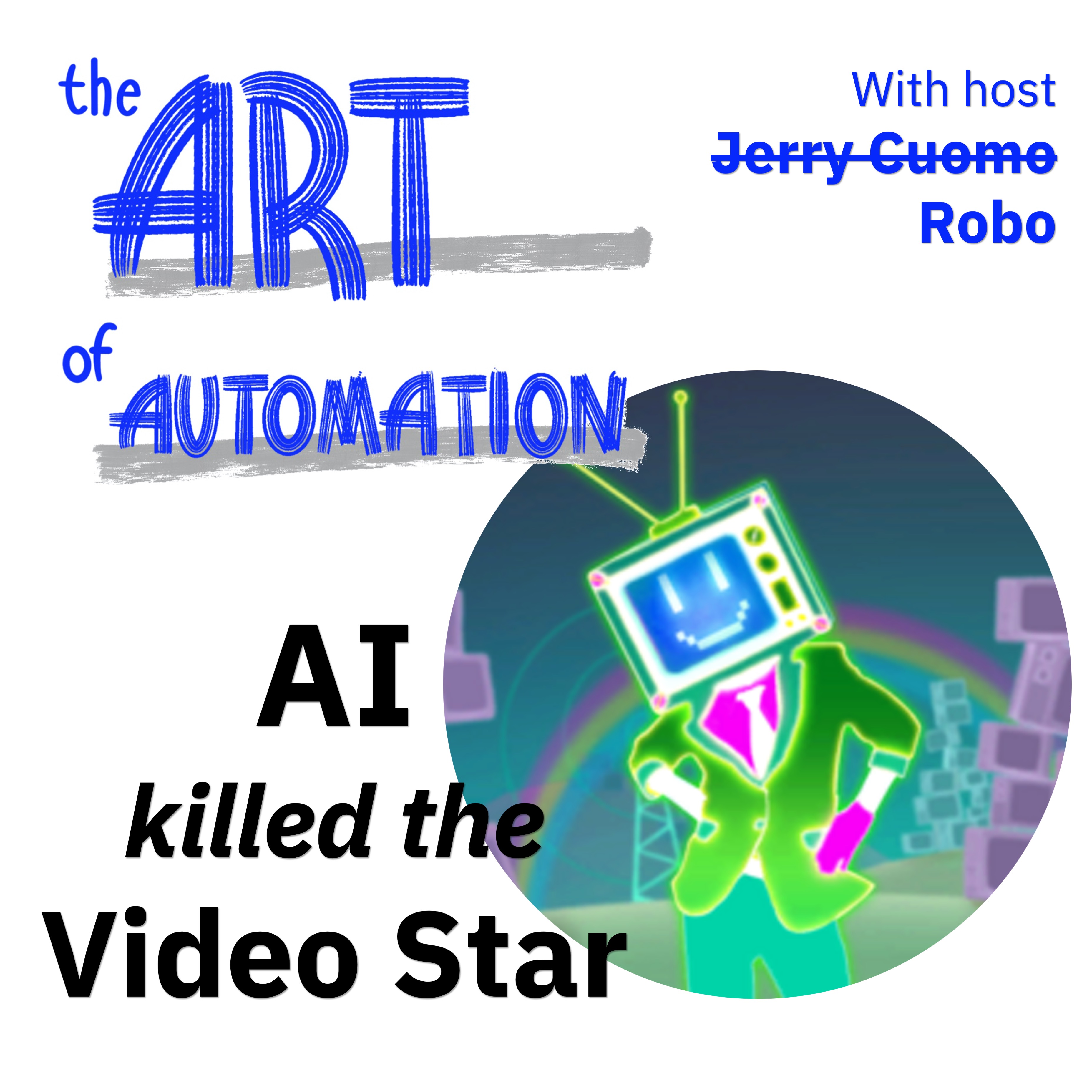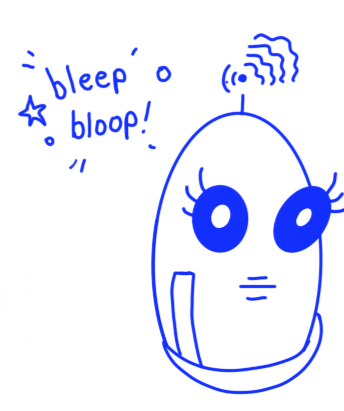AI Killed The Video Star [AI Generated]
- 0.5
- 1
- 1.25
- 1.5
- 1.75
- 2
DJ: You are listening to the Art of Automation Podcast with your host, Jerry Cuomo.
Robo the Bot: Thank you DJ, and welcome to the Art of Automation, a podcast that explores the application of automation in the enterprise. If video killed the radio star, then I guess this short episode of the Art of Automation podcast is about how AI is making a play to kill the video star. Well, maybe that's a bit dramatic. Hello, I'm Robo the Bot, and I'm the host of today's episode, which looks at an example of AI generated video. Maybe a more accurate depiction might be how AI is augmenting the video star. Today, we have short demonstrations of a few of the many such AI tools that are emerging onto the scene. You've seen what ChatGPT can do for text generation, analysis, and summarization. These video and audio tools use similar generative AI techniques to create real- to- life animations, and you've been watching one right now. This is a tool called Pictory.AI. Pictory automatically creates creative videos that coincide with a script that you provide. Pretty cool, wouldn't you say? Oh, and all along my voice has been generated by an AI tool called Natural Reader. It's a text to speech application with natural sounding voices that can read to you any texts such as Microsoft Word files, webpages, PDF files and emails, and more. Special thanks to you, Natural Reader, for giving me a voice. And last but not least, here's a demo of Synthesia. Synthesia is pretty cool. It offers a user- friendly platform with a variety of avatars to choose from, where you can perform in many languages from a script that you provide. You can also customize by training your own avatar, which Jerry Cuomo recently did in this generated video where his avatar reflects on the internet, and provides a three- minute journey through its past, present, and future. Please watch'til the very end. He also does a demonstration of his avatar speaking in Italian, Spanish, and French. Roll the video.
Jerry Cuomo: Hello, I'm Jerry Cuomo. Actually, I'm his digital avatar. I've been fortunate enough over the past few decades to grow my career at the same time the internet was transforming our world. It has been an incredibly fulfilling experience to witness, and even contribute, to the marvels of the internet. Recently, a student reached out to me for help with a homework assignment on the Internet's greatest benefits and ways to make it even better in the future. I was excited to share this point of view. You see, the internet is one of the most important inventions in human history right up there with the development of the spoken language. Just think about it, both language and the internet have allowed us to share knowledge and experiences with each other in ways that have helped us grow and evolve as a species. The internet has given us many amazing things that have made the world a better place. For example, we now have online schools where you can learn from anywhere in the world, which means more people can get an education. We also have telemedicine services where you can see a doctor over the internet, which makes it easier to get medical help, especially if you live far away from a hospital. And finally, we have e- commerce websites where you can buy and sell things online, which is really helpful when you can't go to a store, or when you need to buy something from another part of the world. All of these things have made life easier for people, and helped to connect us in new and exciting ways. The internet has brought many benefits to our lives, but there are still areas where it can improve. Unfortunately, somewhere along the way, people stopped being people on the internet and became users identified by their account IDs. This shift has led to a reduction in people's security, privacy, and ability to profit alongside big companies. The good news is that the future of the internet holds promise for making users into people again, creating a more equitable economy where individuals can profit alongside businesses is one way to improve the internet. Currently, if you create a popular video on social media, the internet companies own the rights and can exclusively profit from it through advertising revenue. However, in the future internet, creators of content will be in the driver's seat. You'll own the rights to your video, and will be compensated by companies as they profit from it. This is a positive development that can empower individuals to receive fair compensation for their creative contributions. In addition, it's crucial that the internet is a safe space for everyone's personal information. Currently, personal information is scattered around various websites, which can be overwhelming and disorganized. I don't know about you, but my digital life is a mess. However, in the future of the internet, we should have one account, just one for all our online activities, using our biometrics as our password. This would make our online experience more convenient and secure, and help us avoid the hassle of managing numerous accounts and passwords. By focusing on these changes, we can create a more equitable and safer internet, ensuring that it continues to positively impact humanity for generations to come. As for me, I'm off to the metaverse to meet up with some friends. Thanks for joining me on this journey through the past, present, and future of the internet.
Speaker 3: foreign language.
Speaker 4: foreign language.
Speaker 5: foreign language.
Human Jerry Cuomo: Okay, folks, that's it for today. And by the way, this is Human Jerry Cuomo, and I hope you've enjoyed today's demonstrations. And I hope they've given you some idea of how you can put generative AI to work to reimagine how you work and play. And yes, that was all AI- generated. My mouth and eye movements, blinks and hand gestures were all derived from my training, and they matched to a script that I provided. There you have it. So what you going to do with it? I've included links to these AI tools in today's show description. And if you enjoy this podcast, it's also likely that you'll enjoy the Art of Automation book, which is now available. A link to the book is available in the description section, and royalties for the Art of Automation book are being donated to help support cancer research. Okay, once again, I'd like to thank Robo, and of course I'd like to also thank you all for listening in. This is Jerry Cuomo, IBM fellow, and VP for Technology at IBM. See you again on an upcoming episode.
DESCRIPTION
Attention, listeners! Get ready for an episode that will likely blow your mind! If video killed the radio star, today we will demonstrate how AI has killed the video star. Okay, maybe we’re being a bit dramatic. This video episode showcases some very impressive tools in the world of AI-generated content. Watch video here on Casted.io
On display in this episode are Pictory.AI, which helps you create stunning videos that perfectly match your script. Natural Reader offers a text-to-speech application with voices so natural that you'll be amazed. And with Synthesia, you can customize your own avatar to speak fluently in multiple languages. But that's just the beginning.
Hosting this episode is Robo the bot, who explores how these tools are revolutionizing the industry, with compelling and near-realistic results. And to top it off, Jerry showcases his own AI-generated avatar, delivering a performance titled, “Reflecting on the Internet: A 3-Minute Journey Through Its Past, Present, and Future”. And he even does a few out-takes in multiple languages… Robo guarantees it will leave you speechless. So, get ready to witness the future of media on The Art of Automation podcast!
Here are some links to show related content.
• Pictory.AI: A tool for creating stunning videos that match your script with real-to-life animations
• Natural Reader: A text-to-speech application that offers a wide range of natural-sounding voices to read any text, including webpages, PDF files, and more
• Synthesia: A platform for creating customizable avatars that can speak fluently in multiple languages
• The Art of Automation book: A book that explores the application of automation in the enterprise, with royalties being donated to cancer research
Things to listen for:
- [00:20 - 02:08] Introduction by Robo the Bot
- [02:09 - 05:06] The past, present, and future of the internet









